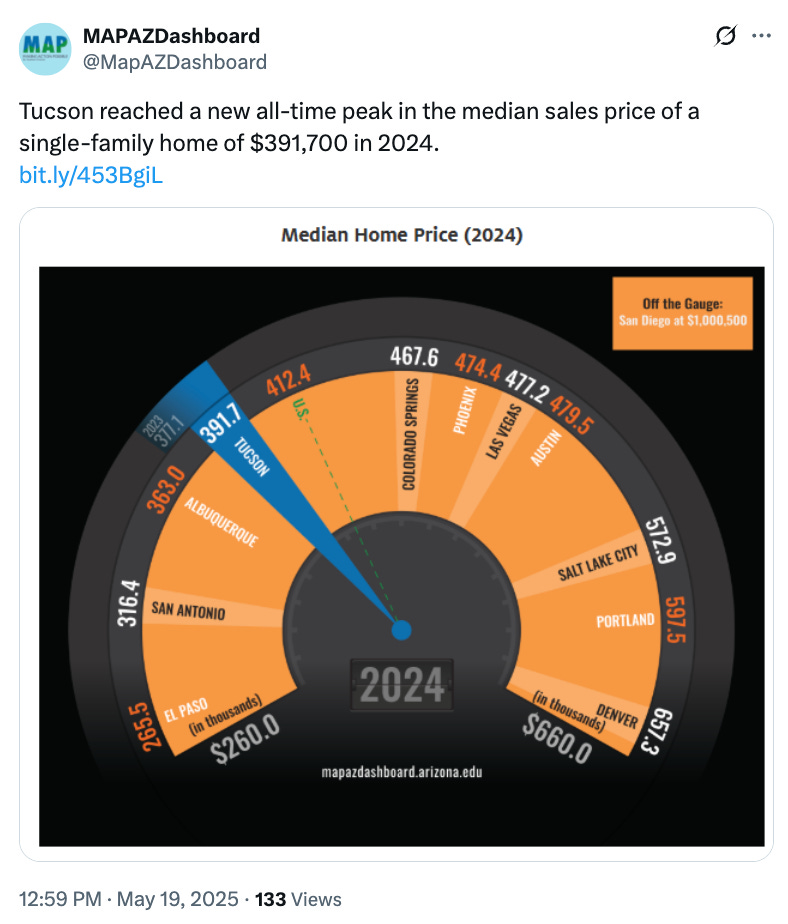It’s gonna be a long one
Local officials have a lot on their plates … Utilities catch a break … And that’s some serious political baggage.
It’s probably a good thing the Agenda comes out at 6 a.m. It gives us time to give you a heads-up: If you closely follow southern Arizona politics, today’s a day to pack a lunch, a dinner and some popcorn.
Today promises marathon sessions of both the Pima County Board of Supervisors and the Tucson City Council. And if you feel bad that you might be behind on various topics, just imagine how the newbies feel. Both bodies appointed someone as a voting member in the last five weeks.

Our art intern, ChatGPT, thinks at least some supervisors are happy to see three giant stacks of county memos.The Board of Supervisors meets at its usual time, but has a 74-item agenda (yes, this includes some mundane things like proclamations) including two executive session items on:
Further discussions on suing the federal government over federal funding (They sued the feds last week over $12 million in FEMA reimbursements for housing asylum seekers.)
A discussion on “encampments” on county-owned land. While details are scarce, this is likely following similar discussions around the state on how to protect cities and counties from future Proposition 312 lawsuits. (The best example of this locally is the saga at the City of Tucson over banning people from sleeping in washes — which is still unresolved.)
And those are just the appetizers. Supervisors are going to dig deep into the county’s annual $1.75 billion budget, which would raise property taxes if adopted as proposed.
County officials continue to tweak the budget behind the scenes and we’re still predicting that some elected officials and department heads may use Tuesday’s meeting as a venue to directly advocate for additional funding not contained in County Administrator Jan Lesher’s proposed budget.
We covered the county budget from the 30,000 foot level last week, both here and here, but we expect a few last-minute changes from the board today.
Also playing a role in the budget decisions is the county's grim analysis of the proposed federal budget released by the Trump administration on May 2. County administration highlighted tens of millions of dollars in grant funding that has either been eliminated or reduced significantly.
Also on the agenda: Supervisor Matt Heinz’s revised proposal to create a $225 million fund over the next decade (fueled by increasing property taxes slightly every year) that would offer incentives to developers to build affordable housing here in Pima County.
Heinz modified his initial proposal — which supervisors have considered twice and postponed twice — to be relatively budget neutral in the next fiscal year.
His office predicts the increased cost to the average homeowner would be just $3.60 for the first year of the increase, although the rate increases every year by three cents for the next decade.
Reading the County’s 18-page agenda for today’s meeting is a walk in the park compared to tracking the changes in policy and figures and understanding the messy politics behind them. That requires some dedicated reporting. Upgrade your subscription today to support independent journalism.
As we explained above, there are dueling marathons for local political junkies. Reporters and community activists will have to decide where they want to spend their time today as the Tucson City Council meeting starts at 11 a.m.
The (kinda) good news is that the Council will spend roughly 90 minutes in executive session, so you don’t have to roll through security until 12:30 p.m. And then it’s a quick … seven hours of the City Council meeting, with maybe a handful of breaks in between if we’re lucky.
Like with the county, the City Council will discuss its proposed budget for next year, both during the afternoon study session and again at their “regular” meeting — which starts at 5:30 p.m. This gives city residents a chance to weigh in on the proposed $2.4 billion spending plan before it’s approved next month.
Other items on the agenda include:
A federally mandated report on possible changes to 11 separate bus routes. The Council earlier this year started discussions about eliminating as many as five routes to cut about $1 million a year out of the city’s transportation budget.
The Council is expected to spend 30 minutes discussing a report about the feasibility of creating a public-electric utility. Activists want the Council to pump the brakes on renewing Tucson Electric Power’s franchise agreement, while TEP has suggested a hostile takeover of their infrastructure would lead to a prolonged court battle.
The Council will be asked to weigh in on the future of the Regional Transportation Authority (RTA), and more specifically, “project scope changes and unresolved issues” with the 2006 voter-approved RTA plan. This discussion will likely broaden to include the future of the current executive director of the RTA/Pima Association of Governments Executive Director Farhad Moghimi, who has been the center of a month-long fight among RTA board members who blame him for issues with stalled transportation projects. The Council will likely also discuss whether to support an extension of the half-cent countywide sales tax that funds the RTA, often referred to as RTA Next.
The Council will also get an update on PFAS contamination from Tucson Water Director John Kmiec.
Sausage getting made: The big utilities in Arizona had a great time this legislative session, Capitol Media Services’ Bob Christie reports. After utilities waged a long and expensive effort to curry favor with local and state officials, Gov. Katie Hobbs signed two bills into law that will help the bottom line for Arizona Public Service and Tucson Electric Power. One bill shielded utilities from most lawsuits related to equipment sparking wildfires. The other relaxed the rules for utilities to issue bonds. (Our sister newsletter, the Arizona Agenda, has the political backstory on those bills in today’s edition.)
Setting records: With 138 vetoes already, Hobbs is on track to break the single-session record, which she set in her first year in office. She has no qualms doing it and plans to keep vetoing many of the bills GOP lawmakers send her when they get back from their break, Capitol scribe Howard Fischer reports.
"I have made it clear that I'm not going to sign legislation that is solutions in search of a problem, that takes away people's freedom,” Hobbs said, while a GOP spokesman said "Hobbs has made vetoing good policy her full-time job, rejecting bipartisan solutions supported by the elected representatives of the people of Arizona.”
Managing Medicaid: U.S. Rep. Juan Ciscomani emerged as a key player in the budget debate in Congress, the New York Times reports. The GOP has a tiny majority, so every vote counts. Ciscomani was one of a handful of Republican lawmakers who pushed House leadership to drop two of the most aggressive packages of Medicaid cuts. Ciscomani also held out for tax breaks, like those meant to boost electric vehicles, that were part of the Inflation Reduction Act.
Meeting the demand: The Trump administration’s cuts to AmeriCorps are being felt across Arizona, and local food banks are trying to adapt, the Arizona Luminaria’s John Washington reports. In April, DOGE announced plans to cut $400 million from the agency, which is basically the Peace Corps but stateside. So far, the ripple effects in Tucson led to the Community Food Bank of Southern Arizona losing two employees tied to AmeriCorps, and more cuts are expected in the coming months. Arizona AG Kris Mayes has filed a lawsuit claiming the cuts are unlawful.
Amid all the shouting about the culture wars and the budget woes of local school districts, it’s easy to lose sight of what education is all about.
Thousands upon thousands of young people doing their best, working hard, and charting the course for Arizona’s future.
So in tomorrow’s edition of the Education Agenda, we’re taking a break from what the adults are doing and focusing on what the “cool kids” are up to.
And, of course, we’ll also get you up to date on what the grownups are doing.
All you have to do is click that button and tomorrow morning you’ll get a fresh breeze in your inbox!
Until recently, the crowd of candidates in Congressional District 6 included “immigration lawyer,” “former Marine,” and “engineer.”
Now it includes “former FBI agent who played a key role in the Hunter Biden investigation and was arrested in March at an airport in New York and accused of printing internal FBI records.”
Johnathan Curtis Buma threw his hat in the ring earlier this month, saying his past work “exposed politically driven manipulation of intelligence within the FBI.”
He is a Democrat who was critical of President Donald Trump during his first term, and also was among the first to bring up allegations in 2023 of Rudy Giuliani's ties to Russian agents.
More recently, Burma told German television broadcaster ZDF that Elon Musk and billionaire GOP megadonor Peter Thiel had been targeted by Russian spies.









When Rep. Ciscomani cuts thousands of his constituents from Medicaid, SNAP (Food Stamps), they will not know it until 1027, after the midterm congressional elections. He is cutting them off to fund Trump's Big Tax Bill for the Filthy Rich. Not his voters.